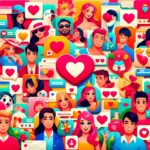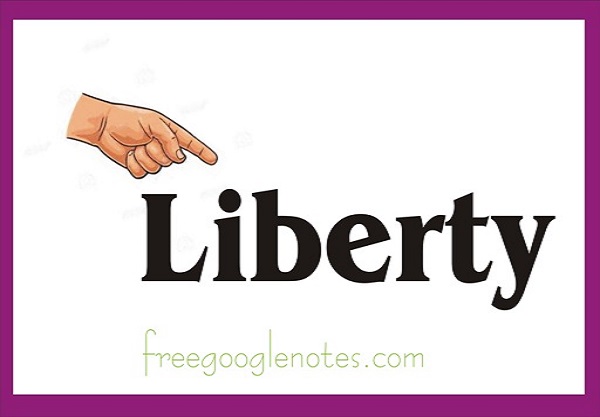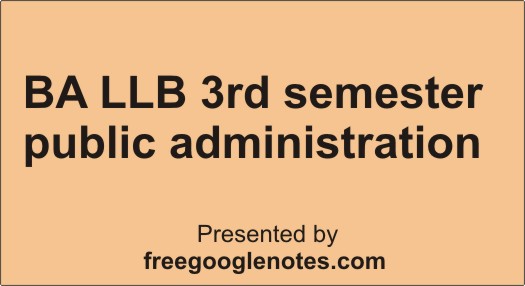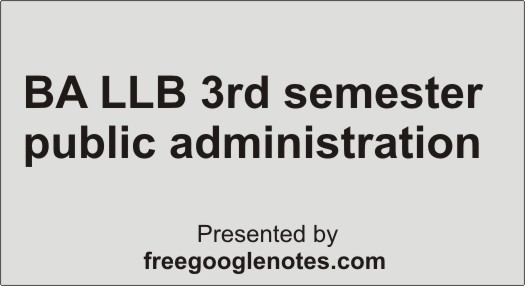Table of Contents
LIBERTY
Q. 1. Definite liberty and explain its elements.
Ans. Liberty and its meaning. Liberty is very important for the man. It is essential for the development of his life. It is only in the atmosphere of liberty and equality that an individual can attains his. best self. But the people do not know the real meaning of liberty. Many think that liberty is to do whatever a man wants to do. They think liberty is the absence of all restraints. But that is not true. In society no person can be given the freedom to do whatever he likes. In society a man has to act according to certain rules, otherwise there would be chaos and there will be no peace and order. Rule of jungle will prevail in people society if every man is left absolutely free from all checks and might would become right. Liberty in its real meaning is the freedom to do what is not harmful to the others, freedom to do what is go for the individual as well as for the society.
Definitions of liberty. Various definitions of liberty have been given by the scholars. Some of them are as under :
1. According to G.D.H. Cole, “Liberty is the freedom of the individual express without external hindrance his personality.”
2. In the words of Seeley, “Liberty is the opposite of over-government.”
3. According to Meckenzie, “Freedom is not the absence of all restraints, but rather the substitution of rational ones for the irrational”
4. In the opinion of T.H. Green, liberty means “The positive power of doing or enjoying something worth doing or worth enjoying.”
5. Prof. Laski says, “By liberty I mean the eager maintenance of that atmosphere in which men have the opportunity to be at their best selves.”
6. According to Herbert Sponsor “Liberty is the freedom for every man to do that which he wills, provided he infringes not the equal freedom of any other man”
7. According to Burns, “Liberty means liberty to grow to one’s natural height, to develop one’s abilities.”
From all the above definitions of liberty it becomes clear that liberty does not mean absolute freedom or absence of all checks on the activities of the individual. It means the freedom of a man to do all those things for the development of his personality, which are not
Q. 2. Define ‘Liberty’ and discuss its various kinds and forms.
Ans. Introduction. The term ‘Liberty’ has not only been confused interpretation but also very much misunderstood. The term has been Jerstood by various philosophers and different sections of community to
suit their interests. For both Plato and Aristotle, liberty could be enjoyed by the citizens alone. According to them slaves had no liberty at all.
In Middle Ages, feudal lords interpreted liberty in a fashion that ined them in exploiting the poor peasants. Adam Smith, the famous
economist, gave quite different interpretation to the term ‘liberty in his Theory of the Laissez Faire.
The term “liberty’ has however, been differently interpreted in modern times. We are living in a materialistic age in which struggle between the rich and poor is continuously going on. In such an age, the rich interpret liberty as freedom to earn as much as they can. The poor on the other hand, understood by liberty the freedom from
exploitation.
Liberty Defined. Liberty is a term which has been greatly misunderstood and misinterpreted with the result that various interpretations by various thinkers have been put forth, e.g. French Declarations of Rights of Man says that liberty is “the power to do everything that does not injure another. Liber says that it is the faculty of uraling to the power of doing what has been willed without influence from any other source.” According to Laksi“I mean by liberty the absence of restraint upon the existence of those social conditions which in modern civilization are the necessary guarantees of the individual happiness.” But perhaps the most suitable definition of the term has been put forth by Herbert Spencer when he says that “every man is free to do what he wills, provided he infringes not the equal freedom of other men.” In other words we can say that liberty is freedom of ding and enjoying what is worth doing and enjoying and has social sanction behind it.
Negative Liberty. Some of the persons take a very negative view liberty, which implies absence of restrain and right to do whatsoever one likes. But this is neither the correct interpretation nor explanation of liberty. If this interpretation is accepted then it shall mean going to the state
of nature in which it was the liberty of the strong. The poor shall then
always be at the mercy of the rich, powerful shall dominate the powerless and everyone shall bow before the most powerful in the
society. Liberty shall be enjoyed as long as the powerful wishes that to
be enjoyed.
Such a conception of liberty is now neither acceptable nor desirable though Anarchists and Syndicalists are of the opinion that the state should least intervene in their personal affairs. They also feel that state is not the custodian of their liberties but snatches that. They want that the state should least intervene in their affairs. Both the Anarchists as well as the syndicalists have, however, not found much support from the society and are practically outdated.
Positively Liberty. There is a positive aspect of liberty as well According to this interpretation, liberty lies in the removal of hindrances. We are living in a society which is divided into two great halves. On the one hand are the rich and on the other the poor; on one side are exploiters and on the other are exploited; on one side are property owners who live on the labour of others whereas on the other hand are those on whose labour these property owners live. In such a society unless there is an authority to check the actions of those who have grown strong, existence shall be difficult for those who are weak and poor.
Positive liberty, therefore, implies and is meant to be under stood as liberty in which adequate facilities are available for each section of the society to live and enjoy socially desirable rights. It is liberty of the type in which the strong and the rich earn what is reasonably proper and desirable and the weak and the poor find opportunities to live properly and honourably. It is freedom of not only a few rich people but for many or rather for the common masses. It created such a harmonuious atmosphere in which everyone feels progressing. In other words we can say that liberty means removal of hindrances from the path of those who are performing desirable social activities. It puts limitations so that all should enjoy in other words we can say that liberty means that one should do the same for others what one wishes others to do for him. We may conclude with Laski when he says that ‘Liberty is the eager maintenance of that atmosphere in which the men have the opportunity to be at their best selves.
Types of Liberty
Natural Liberty. It is generally believed that before man came in the civil state he was living in the state of nature in which he enjoyed certain rights, e.g., the right to life, property and family. Today he lives in the society only to uphold these liberties. These rights were very
valuable to him. In fact he came in the society and accepted all other bondegas to preserve his liberties. Those rights and his liberty which enioyed in pre civil state are called ‘natural liberty’. But this concept liberty is not very much valued because it is felt that in the state of nature
it was might which was right and in it there was no security of and property. Even otherwise this conception of ‘natural rights’ has been found unworkable because in many cases, it is the state which is to be preserved and not the life of individual. The individuals are required to give up their right and liberty of enjoying freedom of life for the sake of state and they most willingly do that.
Civil Liberty. It is liberty which a person enjoys by virtue of his being a member of civil society. Though it is no possible to give a person unrestricted freedom yet he is given liberty necessary enough to have fuller development of his personality. It is the state which guarantees civil liberty either by way of checking the actions of government or other individuals and societies.
The actions of government which hinder or negative civil liberty of individuals are checked by way of ‘Judicial review’. It implies that in case the government tries to go out of the limitations imposed upon it, the courts of law can check it. In other words the courts of law can declare any law unconstitutional if that really is so. Such a system of judicial review exists in India and U.S.A. In a similar way the state checks individuals and societies from encroaching upon the liberties of others. It is done by way of checking such associations or individuals from doing anti-social actions or by way of enacting healthy laws.
On the whole, the state guarantees freedom of life to all possible extents, except when it itself is in danger. Civil liberty also implies equality before law, without taking into consideration the status of man, freedom of possession and using rightfully earned property; freedom of speech; discussion; worship and also to enjoy a family life.
Political Liberty. By political liberty is understood that type of liberty in which people enjoy certain political rights, e.g.; the people are given liberty to be elected as representatives of people, they are
Free to cast their votes in the manner they like This freedom also implies that each citizen has the right to hold any public office to which he
entitled and has been considered suitable either by way of
nomination, selection or election.Political liberty in its real sense can only be achieved when the people have some share in the formation of government. In the people
have some share in the formation of government. In fact, the more the people are given share in their administration the more political freedom they shall be enjoying. This is why it is called that democratic forme government ensures maximum political liberty.
At this stage, it will, however, be desirable to say that there is close relationship between civil and political liberty. It is perhaps rightly felt that unless political liberty is there, civil liberties cannot be enforced because it is by exercising the former that latter comes into active operation.
Economic Liberty. It is another type of liberty which implies that the people should have freedom to earn their livelihood provided the method and extent of earning is socially just and desirable. Though the capitalists and the rich feel that economic liberty means unrestricted earning yet in practice it has been condemned.
Economic liberty has another aspect also which means introduction of democracy in industry. Industry, however, is being understood in a wider term in which all wealth-producing agencies are included. In an industry based on democratic set up workers have some say in the management of their affairs. They enjoy some rights, take some initiative in industry and even have some share in the profit. On the other hand, democracy in industry means right to have reasonable wages, hours of work, leisure and old age pension, etc.
National Liberty. It is rather the most importance of all types of liberties which we enjoy today. From national liberty is understood that freedom in which a nation is free both internally as well as externally. In other words, national liberty means national sovereignty. It also implies right of self-determination by the state.
Q. 3. What are the various kinds of Liberty ?
Ans. Kinds of Liberty. Liberty plays an important role in the life of an individual. He cannot realise his fullest self in the absence of liberty. Life of the individual has many aspects and liberty in that aspect is called by that type of liberty. For example liberty in economic life is called Economic Liberty. Liberty in political life is called Political Liberty and so on. Thus there are various kinds of liberty as given below :
1. Natural Liberty, 2. Moral Liberty, 3. National Liberty, 4. Civil Liberty, 5. Economic Liberty, 6. Political Liberty, 7. Personal Liberty.
1. Natural Liberty. There are some scholars who are of the opinion that some liberty has been given to the individual by nature. This liberty
was enjoyed by the individual even before the emergence of the state.
Society or state cannot deprive the man from enjoyment of that liberty. Even today man enjoys that liberty. Some scholars says that natural is that liberty which is essential for the man because of his nature
Thus liberty is natural an essential both and has to be given to the individual even in a despotic state. Rousseau say, “Man is born free e everywhere in chains.” He also says, “What a man loses by the
contract is his natural liberty and unlimited right to anything that tempts him which he can obtain.”
But the concepts of natural liberty cannot be accepted. Liberty given by nature must be unlimited and unrestrained. In society no man
be given unrestrained freedom to do whatever he likes. There can he no liberty outside the state and in atmosphere of unlimited and freedom liberty, might becomes right. Natural liberty cannot be enjoyed by all the people alike and it cannot be for the good for the society. Some liberty is essential for the development of life of individual because of his nature. In that sense the concept of natural liberty, can be accepted. But in society a man can be given freedom only to the extent
that it does not encroach upon the freedom of others.
2. Moral Liberty. Scholars like T.H. Green, Bosanquet, Kent, Hegel, Rousseau have pointed out great importance of moral liberty which according to them is the real liberty. Moral liberty means that the man should be free from all temptations and he should be free to do what is morally good and desirable. It is concerned with the conscience of the man and he should be free to do what seems good to his conscience. When a man has to do something against the moral principles, against his conscience, against what appears to be good to him, he is no morally free and in this atmosphere he cannot realise. fullest development of his life. It may be kept in mind that like natural liberty, moral liberty is also outside the purview of the state. It is neither prescribed by the state, nor is protected by the law and the law courts.
3. National Liberty. National liberty means liberty from foreign rule. When a nation is not under the control of another nation, when it can decide independently about its own government set up, it can make and unmake laws of its choice, when it can independently decide about the war and peace, it possesses national liberty. It is identical to sovereign. It is more important than the liberty of individuals.it means a nation should be free make efforts for its development. Without national liberty, no
society can make its national development. À free nation can give rights and liberties to its citizens. Before 15th August 1941, possess national liberty.
4. Civil Liberty. Civil liberty means that liberty which is enjoyed the member of an organized society, by exercising which he can have fullest development of his social life. It means those facilities which an individual enjoys in the society and because of which he can act independently without interference from others. According to Gettel, “Civil liberty consists of the rights and privileges which the state creates and protects for its subjects.” Man needs and exercises so many freedoms while living in the society. It is given to all the members of the society or equal basis. Rights like right to life, right to freedom of speech and expression, right to property, right to freedom of movement, right to family, right to form association, right to settle in any part of the state, right to work, right to freedom of religion, right to education are enjoyed by the people under civil liberty. Every state in a democratic set-up tries to create and give maximum civil liberty to its members because this helps in the development of their life. An individual is able to lead a civilized life in society only if he enjoys civil liberty.
5. Economic Liberty. Economic liberty means liberty in the economic field. It means that liberty which help the man to make his fullest economic development, which helps the man fulfil all his economic needs without any fear to pressure. Economic liberty means liberty from hunger and starvation, freedom from any type of fear while doing work, freedom from worries of bread and butter. Economic liberty does not mean that every man should be free to do what he likes in the economic field. It does not mean free trade and open competition. Economic liberty means that every individual should have guarantee of getting minimum standard of living. According to Laski, economic liberty means, “security and opportunity to find reasonable significance in the earning of daily bread. I must, that is, be free from the constant fear of unemployment and insufficiency, which perhaps be safeguarded against the wants of tomorrow.” Thus economic liberty means end of open competition, guarantee of minimum standard of living for every individual, guarantee of work, guarantee of minimum wages a maximum working hours and provision of economic security, minimum gap between the rich and the poor. It means a man may have to do what he does not want to do fear earning his livelihood.
6. Political Liberty. Political liberty means enjoyment of political
Right and it is essential for the development of political life of the wal. It means the individual should be free to exercise his political rights
dependently. The individuals should have freedom to elect their representatives, to be elected to the representative assemblics, freedom to hold public offices and freedom to criticize the government fearlessly. Political liberty also means liberty to take active part in the administration state. It means the people should have power and freedom to choose their own government. Political liberty can be enjoyed by the ople only in a democratic set up. A despotic state creates and gives l and economic liberty but does not give political liberty to its citizens.
political liberty consists mainly of (1) the right to vote on universal adult franchise, (2) right to be elected, (3) right to hold public offices, (4) right to criticise the policies and programmes of the government.
7. Personal Liberty. Personal liberty means liberty in thc personal life of thc individual. It means the individual should have complete freedom in doing those things which are concerned with his own life and do not affect the other members of the socicty. J.S. Mill was an advocate of personal liberty. He had divided the actions of the individuals into two categories – those which affected others also and those which did not affect others. The functions of the individual which did not affect the others should be left at the entire discretion of the individual and the state should not make laws about them and should not interfere in them. But in actual practice there is not even a single action of the individual which does not affect the others. However the state should interfere least in the personal life of the individual. The state should not interfere in matters like family life, marriage, religion, dress, meals etc. The state may make general rules regarding these matters but individual should be left free as far as possible in such matters.
Q. 4. “Liberty does not mean absence of restraints, but imposition of rational restraints.” Discuss.
“Liberty means absence of restraints.” Do you agree with this view?
Ans. “Liberty means absence of restraints”
There are two schools of thought on the concept of liberty, one in considers liberty in its absolute aspect, putting no restraints on ” actions of the individuals, and the other which considers it in positive spect, putting reasonable and rational restrictions for the sake of social good on the actions of the individuals
Those who take liberty in its absolute or negative aspect are of
the opinion that there should be no restraints on the actions of the individuals and they should be left free to do whatever they like. The state is a necessary evil and its every act or law interferes in the liberty of the individual. The state therefore should perform the minimum possible functions. Less the laws, more the liberty. That state is the best which governs the least. Individualists and classical liberalists were of this view. J.S. Mill had taken liberty in this aspect and had pleaded that there should be no restriction or check on the activities of the individual and he should be free from all social and political restraints Anarchists also consider the state to be an evil and the man to be good by nature. As such the man needs no check or restraint imposed by the state as the law makes him wicked and also steals away his liberty. Such scholars oppose any restraint on the activities of the individual Con moral, economic and scientific basis.
But such a liberty, absence of restraints, is not practicable and is not real. Only in jungle such an atmosphere can exist, where might becomes right and only the powerful can survive. A man who is social by nature has to live in society and while doing so, he cannot be left absolutely free, to do whatever he likes. In society man has to follow certain rules for the sake of security of life and peace and order for progress.
“Liberty does not mean absence of restraints, but imposition of ‘rational restraints.”
Real-liberty is liberty in its positive aspect. The state is not an evil and its laws: do not curtail liberty. It is only the laws which define, conforce and protect liberty, and liberty in the real sense means freedom to do those things which are worth doing and freedom of enjoying those things which are worth enjoying in the society. According to Seeley, “Liberty is the opposite of over-government.” It means the state should not make undue interference in the activities of the individuals. According tò Herbert Sponsor, “Liberty is the freedom for every man to do that which he wills, provided he infringes not the equal freedom of any other man.” This definition also says that restraints have to be put on the activities of man to ensure the liberty of others. According to Meckenzie, “Freedom is not the absence of all restraints ; but rather the substitution of rational ones for the irrational.”. Accordingly it is the irrational restrictions which curtail liberty. Unrestrained liberty to the individual to do what he wants will create the atmosphere of jungle where might is right. In jungle all animals cannot move freely. There
The physical force prevails and rules. But in human society all the duals live in cooperation and harmony. This liberty does not mean freedom to do what one likes or wants to do, but really means dom to do what he should do in the society, what is beneficial to
as well as to others. According to Rousseau, individual’s freedom in obedience to general will which also includes his real will.
By liberty the individual wants to participate in the sovereign authority. It means he wants to act and decide himself, and does not want to be acted upon and decided by others. It, at the same time, means liberty of the ‘rational self.’ This rational self identifies the individual with the social whole of which the individual is an integral part. Thus, for the sake of social good, reasonable restrictions have to be imposed on the activities of the individual so that he may not cause harm to others.
No society has been able to give unrestrained freedom to its members so far. It is only within the state that rights and liberty can be given to and enjoyed by the individuals. But there should be no unreasonable and irrational check on the activities of the individual in the society and he should be ensured of that atmosphere in which he can realise the fullest development of his life. It has thus rightly been said that “Liberty does not mean absence of restraints, but imposition of rational restraints.”









